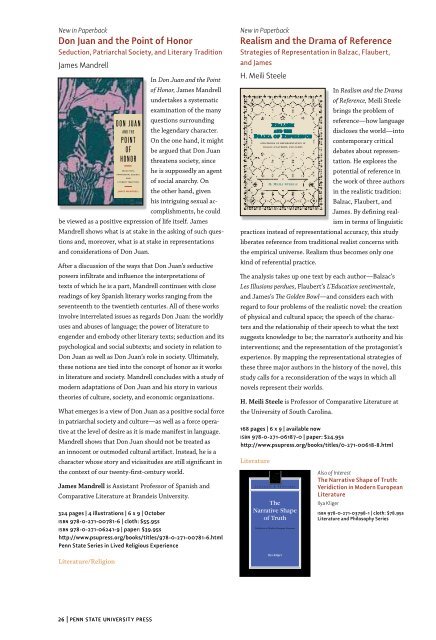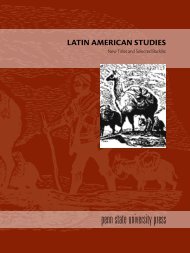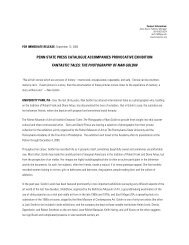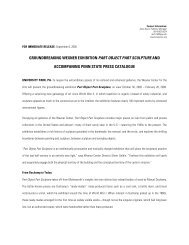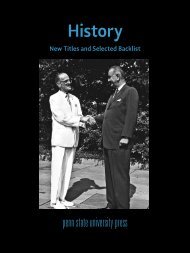Download the Catalog - Pennsylvania State University Press
Download the Catalog - Pennsylvania State University Press
Download the Catalog - Pennsylvania State University Press
Create successful ePaper yourself
Turn your PDF publications into a flip-book with our unique Google optimized e-Paper software.
New in Paperback<br />
Don Juan and <strong>the</strong> Point of Honor<br />
Seduction, Patriarchal Society, and Literary Tradition<br />
James Mandrell<br />
In Don Juan and <strong>the</strong> Point<br />
of Honor, James Mandrell<br />
undertakes a systematic<br />
examination of <strong>the</strong> many<br />
questions surrounding<br />
don juan<br />
and <strong>the</strong> <strong>the</strong> legendary character.<br />
point On <strong>the</strong> one hand, it might<br />
o f be argued that Don Juan<br />
honor threatens society, since<br />
seduction,<br />
he is supposedly an agent<br />
patriarchal society,<br />
and<br />
literary tradition of social anarchy. On<br />
james mandrell <strong>the</strong> o<strong>the</strong>r hand, given<br />
his intriguing sexual accomplishments,<br />
he could<br />
be viewed as a positive expression of life itself. James<br />
Mandrell shows what is at stake in <strong>the</strong> asking of such questions<br />
and, moreover, what is at stake in representations<br />
and considerations of Don Juan.<br />
After a discussion of <strong>the</strong> ways that Don Juan’s seductive<br />
powers infiltrate and influence <strong>the</strong> interpretations of<br />
texts of which he is a part, Mandrell continues with close<br />
readings of key Spanish literary works ranging from <strong>the</strong><br />
seventeenth to <strong>the</strong> twentieth centuries. All of <strong>the</strong>se works<br />
involve interrelated issues as regards Don Juan: <strong>the</strong> worldly<br />
uses and abuses of language; <strong>the</strong> power of literature to<br />
engender and embody o<strong>the</strong>r literary texts; seduction and its<br />
psychological and social subtexts; and society in relation to<br />
Don Juan as well as Don Juan’s role in society. Ultimately,<br />
<strong>the</strong>se notions are tied into <strong>the</strong> concept of honor as it works<br />
in literature and society. Mandrell concludes with a study of<br />
modern adaptations of Don Juan and his story in various<br />
<strong>the</strong>ories of culture, society, and economic organizations.<br />
What emerges is a view of Don Juan as a positive social force<br />
in patriarchal society and culture—as well as a force operative<br />
at <strong>the</strong> level of desire as it is made manifest in language.<br />
Mandrell shows that Don Juan should not be treated as<br />
an innocent or outmoded cultural artifact. Instead, he is a<br />
character whose story and vicissitudes are still significant in<br />
<strong>the</strong> context of our twenty-first-century world.<br />
James Mandrell is Assistant Professor of Spanish and<br />
Comparative Literature at Brandeis <strong>University</strong>.<br />
324 pages | 4 illustrations | 6 x 9 | October<br />
isbn 978-0-271-00781-6 | cloth: $55.95s<br />
isbn 978-0-271-06241-9 | paper: $39.95s<br />
http://www.psupress.org/books/titles/978-0-271-00781-6.html<br />
Penn <strong>State</strong> Series in Lived Religious Experience<br />
New in Paperback<br />
Realism and <strong>the</strong> Drama of Reference<br />
Strategies of Representation in Balzac, Flaubert,<br />
and James<br />
Realism and <strong>the</strong> Drama of Reference<br />
H. Meili Steele<br />
In Realism and <strong>the</strong> Drama<br />
of Reference, Meili Steele<br />
brings <strong>the</strong> problem of<br />
reference—how language<br />
Realism<br />
and <strong>the</strong><br />
discloses <strong>the</strong> world—into<br />
Drama of Reference<br />
strategies of representation in contemporary critical<br />
balzac, flaubert, and james<br />
debates about representation.<br />
He explores <strong>the</strong><br />
potential of reference in<br />
H. Meili Steele<br />
<strong>the</strong> work of three authors<br />
in <strong>the</strong> realistic tradition:<br />
Balzac, Flaubert, and<br />
James. By defining realism<br />
in terms of linguistic<br />
practices instead of representational accuracy, this study<br />
liberates reference from traditional realist concerns with<br />
<strong>the</strong> empirical universe. Realism thus becomes only one<br />
kind of referential practice.<br />
The analysis takes up one text by each author—Balzac’s<br />
Les Illusions perdues, Flaubert’s L’Education sentimentale,<br />
and James’s The Golden Bowl—and considers each with<br />
regard to four problems of <strong>the</strong> realistic novel: <strong>the</strong> creation<br />
of physical and cultural space; <strong>the</strong> speech of <strong>the</strong> characters<br />
and <strong>the</strong> relationship of <strong>the</strong>ir speech to what <strong>the</strong> text<br />
suggests knowledge to be; <strong>the</strong> narrator’s authority and his<br />
interventions; and <strong>the</strong> representation of <strong>the</strong> protagonist’s<br />
experience. By mapping <strong>the</strong> representational strategies of<br />
<strong>the</strong>se three major authors in <strong>the</strong> history of <strong>the</strong> novel, this<br />
study calls for a reconsideration of <strong>the</strong> ways in which all<br />
novels represent <strong>the</strong>ir worlds.<br />
H. Meili Steele is Professor of Comparative Literature at<br />
<strong>the</strong> <strong>University</strong> of South Carolina.<br />
168 pages | 6 x 9 | available now<br />
isbn 978-0-271-06187-0 | paper: $24.95s<br />
http://www.psupress.org/books/titles/0-271-00618-8.html<br />
Literature<br />
Literature & Philosophy<br />
The<br />
Narrative Shape<br />
of Truth<br />
Veridiction in Modern European Literature<br />
Also of Interest<br />
The Narrative Shape of Truth:<br />
Veridiction in Modern European<br />
Literature<br />
Ilya Kliger<br />
isbn 978-0-271-03798-1 | cloth: $78.95s<br />
Literature and Philosophy Series<br />
religion around<br />
shakespeare<br />
P E T E R I V E R K A U F M A N<br />
Religion Around Shakespeare is <strong>the</strong> inaugural<br />
book in <strong>the</strong> Religion Around series. Books<br />
in this series examine <strong>the</strong> religious forces<br />
surrounding cultural icons from all facets<br />
of world history and contemporary culture.<br />
By bringing religious background into <strong>the</strong><br />
foreground, <strong>the</strong>se studies will help give<br />
readers a more complex understanding and<br />
greater appreciation for individual subjects,<br />
<strong>the</strong>ir work, and <strong>the</strong>ir lasting influence.<br />
Forthcoming volumes will explore <strong>the</strong> religion<br />
around Emily Dickinson, Virginia Woolf,<br />
and Langston Hughes, among o<strong>the</strong>rs.<br />
Religion Around Shakespeare<br />
Peter Iver Kaufman<br />
“Peter Iver Kaufman examines in impressive detail <strong>the</strong><br />
religious soil in which Shakespeare’s plays flourish. By offering<br />
an expert survey of an immensely complex terrain, this<br />
book will serve those who want to scrutinize <strong>the</strong> religious<br />
discourses embedded in <strong>the</strong> plays. This book is significant,<br />
<strong>the</strong>n, for Shakespearean scholars, for scholars of early modern<br />
English non-Shakespearean drama, and for historians<br />
of <strong>the</strong> English Reformation. Its originality derives from <strong>the</strong><br />
author’s command of his special subject: no o<strong>the</strong>r historian<br />
of religion has examined early modern English religion<br />
with as scrupulous and searching an eye to its potential<br />
Shakespearean connections. The value of <strong>the</strong> book lies in its<br />
extended examination of <strong>the</strong> religious pastures seemingly<br />
outside <strong>the</strong> plays’ boundaries and into which <strong>the</strong> plays<br />
occasionally wander. It’s difficult to think of any recent<br />
book to which Kaufman’s can be accurately or extensively<br />
compared, an originality that will be its chief source of value<br />
for literary scholars. They will deeply profit from what this<br />
distinguished historian of religion has provided.”<br />
<br />
—Richard Mallette, Lake Forest College<br />
For years scholars and o<strong>the</strong>rs have been trying to out<br />
Shakespeare as an ardent Calvinist, a crypto-Catholic, a<br />
Puritan-baiter, a secularist, or a devotee of some hybrid<br />
faith. In Religion Around Shakespeare, Peter Kaufman sets<br />
aside such speculation in favor of considering <strong>the</strong> historic<br />
and religious context surrounding his work. Employing<br />
extensive archival research, he aims to assist literary<br />
historians who probe <strong>the</strong> religious discourses, characters,<br />
and events that seem to have found places in Shakespeare’s<br />
plays and to aid general readers or playgoers developing an<br />
interest in <strong>the</strong> plays’ and playwright’s religious contexts:<br />
Catholic, conformist, and reformist. Kaufman argues that<br />
sermons preached around Shakespeare and conflicts that<br />
left <strong>the</strong>ir marks on literature, law, municipal chronicles,<br />
and vestry minutes enlivened <strong>the</strong> world in which (and with<br />
which) he worked and can enrich our understanding of <strong>the</strong><br />
playwright and his plays.<br />
Peter Iver Kaufman is Modlin Professor at <strong>the</strong> <strong>University</strong><br />
of Richmond and Professor Emeritus, <strong>University</strong> of North<br />
Carolina at Chapel Hill.<br />
208 pages | 5.5 x 8.5 | December<br />
isbn 978-0-271-06181-8 | cloth: $34.95s<br />
http://www.psupress.org/books/titles/978-0-271-06181-8.html<br />
Religion Around Series<br />
Literature/Religion<br />
Literature/Religion<br />
Ilya Kliger<br />
26 | penn state university press<br />
1-800-326-9180| 27


